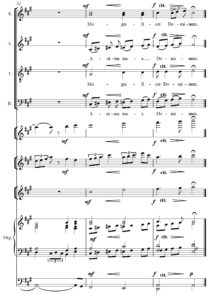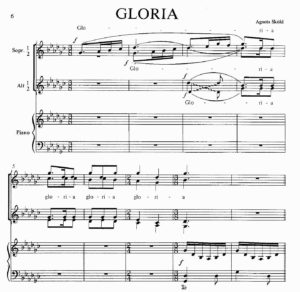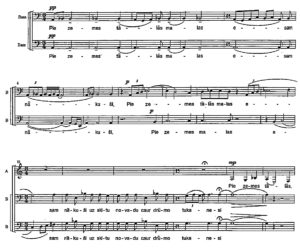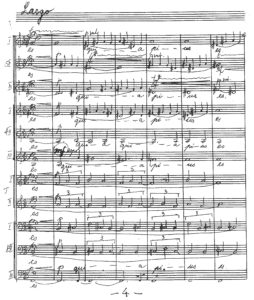An Exploration of Sacred Choral Settings by Women Composers from Northern Europe
T.J. Harper, choral conductor and teacher
Throughout history the more complex activities have been defined and redefined, now as male, now as female, sometimes drawing equally on the gifts of both sexes. When an activity to which each could have contributed…is limited to one sex, a rich differentiated quality is lost from the activity itself.[1]
– Margaret Mead
In this statement, noted cultural anthropologist, Margaret Mead (1901-1978) speaks to a universal challenge affecting all people in all disciplines. In choral music, Mead’s “rich differentiated quality” has historically been absent from both the composition of choral music and from subsequent performances. Though there have been a number of women composers who have made great contributions to the canon of choral repertoire over the centuries, the majority of choral music currently being composed, studied, and performed is still written by men. As far back as 1880, music critic George P. Upton argued, “it does not seem that woman will ever originate music in its fullest and grandest harmonic forms. She will always be the recipient and interpreter, but there is little hope she will be the creator.”[2] Moving forward, it is the responsibility of choral musicians to advocate for and seek out exceptional choral compositions by both women and men.
In recent decades, the number of women composers has grown considerably around the world. While it may be shortsighted to assume the tradition of choral composition continues to progress simply because there are more women composers, there can be no doubt that the trend towards equality in this field exists. Three women who are at the vanguard of this trend and enriching the landscape of sacred choral composition with their unique vision are Kristina Vasiliauskaitė (Lithuania), Agneta Sköld (Sweden), and Maija Einfelde (Latvia). The authenticity expressed in the music of these composers is born out of a clearly defined personal faith, and by the socio-political hardships they witnessed in their respective homelands. These composers are contributing to and representing an emerging corpus of substantive sacred choral music that is contributing to the “rich differentiated quality” of the choral art.
Kristina Vasiliauskaitė (b. 1956, Vilnius, Lithuania)
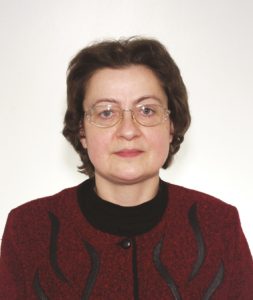 Coming from a large family of musicians, Kristina Vasiliauskaitė has emerged as one of Lithuania’s most prolific composers of sacred choral music. She studied musicology with Jadvyga Čiurlionyte (1974-1975) and composition with Eduardas Balsys (1975-1980) at the Lithuanian Academy of Music. Upon graduation from the Academy, Vasiliauskaitė was appointed the editor of musical programming for the Lithuanian Radio and Television network (1980-1983). She taught at the M. K. Čiurlionis School of Art and in 1993, she was appointed the head of the piano program at the Vilnius Ąžuoliukas Music School where she also began teaching composition in 1996. In 1998, she was granted the title of Senior Teacher of Lithuania.
Coming from a large family of musicians, Kristina Vasiliauskaitė has emerged as one of Lithuania’s most prolific composers of sacred choral music. She studied musicology with Jadvyga Čiurlionyte (1974-1975) and composition with Eduardas Balsys (1975-1980) at the Lithuanian Academy of Music. Upon graduation from the Academy, Vasiliauskaitė was appointed the editor of musical programming for the Lithuanian Radio and Television network (1980-1983). She taught at the M. K. Čiurlionis School of Art and in 1993, she was appointed the head of the piano program at the Vilnius Ąžuoliukas Music School where she also began teaching composition in 1996. In 1998, she was granted the title of Senior Teacher of Lithuania.
The unique quality in the compositional style of Kristina Vasiliauskaitė has established her as one of the leading composers of her generation. As such, she has been recognized for excellence for her compositions Porcupine’s Home, A Breath, Snowflakes Talk, Let’s Sing Alleluia, and From Your Hands. In 2001, she gained international recognition for Magnificat, which received first prize at the ‘4th Annual Juozas Naujalis Composition Competition for Sacred Music’.
The choral music of Kristina Vasiliauskaitė is unique with lyrical warmth that comes from attention to an approachable harmonic style and rich textures. Rolandas Aidukas, describes her music thus:
“Vasiliauskaitė’s musical style is an alternation between diatonic modes and various chromatic detours and modulations. The translucent and delicate musical texture of her compositions exhibits beautiful melody [sic] permeated by romantic emotion. The scores are aesthetically pleasing and capture the ear and understanding of a wide variety and age of listeners. Her vocal compositions display a close relation between the liturgical text and the music, a natural imaginativeness, and clarity of form.”[3]
This “natural imaginativeness” is clearly witnessed throughout the five-movement setting of the Magnificat, which is scored for mixed choir, flute, oboe, trumpet, and organ. In the first movement, Vasiliauskaitė employs various major keys, an unhurried tempo (moderato maestoso), and tonal motion in equal values that confer “nobility and stability to the melody” as musicologist Daiva Tamošaitytė correctly observes. There is an accumulated energy that accompanies each rising sequence of ascending semi-tone phrases, which in affect, expands the tonal landscape to the end of the movement providing adequate space for the joyous text, ‘My soul doth magnify the Lord.’ (Figure 1)
(Click on the image to download the full score)
Figure 1. Vasiliauskaitė, Magnificat, mvt. 1, Lithuanian Music Information www.mic.lt
Selected Compositions
Stabat Mater (2006) – SATB, fl, vln, va, vc, db, org, manuscript*
Magnificat (2005) – SATB, fl, ob, tp, org, manuscript*
Nine Motets of the Good Friday (2005)– SATB, manuscript*
Mass in Honour of St. Cecilia (2003) – SATB a cappella, manuscript*
The Canticle of the Sun by St. Francis of Assisi (1997) – SATB double choir a cappella, manuscript*
Missa Brevis in Honorem Beatae Mariae Virginis (1992) – SATB a cappella, SBMP 265-268
*Available on loan from Lithuanian Music Information www.mic.lt/en/classical/persons/works/139
Agneta Sköld (b. 1947, Västerås, Sweden)
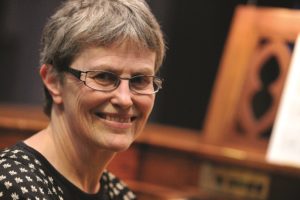 Also from a family of musicians, Agneta Sköld is most widely recognized as a member of the contemporary Swedish Liturgical Movement. She studied at the Royal College of Music in Stockholm and graduated with concentrations in music education, organ performance, and choral music. From 1967 to 1976, she sang professionally in the Swedish Radio Choir and the Eric Ericson Chamber Choir. In 1991, after teaching Music Theory at Ingesund College of Music in Arvika, Sweden, she was appointed the conductor of the Mariakören and the Assistant Organist of Västerås Cathedral. In 1998, she was honored with the distinction of being named the Swedish Choir Leader of the Year. In 2006, Sköld was appointed the Director of Music and Organist of Västerås Cathedral.
Also from a family of musicians, Agneta Sköld is most widely recognized as a member of the contemporary Swedish Liturgical Movement. She studied at the Royal College of Music in Stockholm and graduated with concentrations in music education, organ performance, and choral music. From 1967 to 1976, she sang professionally in the Swedish Radio Choir and the Eric Ericson Chamber Choir. In 1991, after teaching Music Theory at Ingesund College of Music in Arvika, Sweden, she was appointed the conductor of the Mariakören and the Assistant Organist of Västerås Cathedral. In 1998, she was honored with the distinction of being named the Swedish Choir Leader of the Year. In 2006, Sköld was appointed the Director of Music and Organist of Västerås Cathedral.
In pursuit of a greater understanding and appreciation of her art, Agneta Sköld has been the recipient of numerous research grant awards. In honor of her accomplishments as a composer, she has received prestigious awards including the Johannes Norrby Medal in 2003, and the Royal Medal of the 8th Grade from the hands of His Majesty, King Carl-Gustaf the 16th.
Gloria is an exhilarating expression of joy and faith, which gave the composer a sense of hope during a time of personal hardships. The unrelenting intensity of this work is marked by authentic expressivity and conviction. Sköld employs a textural device of motivic layering that along with ascending 16th note ostinati drive the music forward through a gradual increase in both texture and rhythmic activity. (Figure 2)
(Click on the image to download the full score)
Figure 2. Sköld, Gloria, Walton Music HL08500321
Selected Compositions
Corpus Christe Carol (2004) – SATB, Gehrmans musikförlag, 10623, Stockholm
There is no Rose (2004) – SATB, Gehrmans musikförlag, 10553, Stockholm
Magnificat (1998) – SSAA, harp or piano/cello, Sveriges Körförbund/Gehrmans musikförlag, SK877, Stockholm
Kyrie/Gloria (1990) – SSAA, piano, Sveriges Körförbund/Gehrmans musikförlag, SK 656, Stockholm, Walton, USA
Go Crystal Tears – SSAATTBB, Gehrmans musikförlag
Jubilate Deo – SATB, Gehrmans musikförlag, 10624, Stockholm
Maija Einfelde (b. 1939, Valmiera, Latvia)
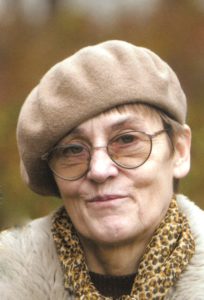 Maija Einfelde’s introduction to music came at an early age. Her father was an organ builder and her mother was a local church organist. She began her music education in Cēsis, at the Alfrēds Kalniņš Music School and then at the Jāzeps Mediņš College of Music in Riga. She studied composition with Jānis Ivanov at the Latvian State Conservatory where she graduated in 1966. In 1968, she began to teach composition and music theory at the Alfrēds Kalniņš Cēsis School of Music, the Jāzeps Mediņš College of Music, the Emīls Dārziņš School of Music, and the Evening Music School of Rīdze.
Maija Einfelde’s introduction to music came at an early age. Her father was an organ builder and her mother was a local church organist. She began her music education in Cēsis, at the Alfrēds Kalniņš Music School and then at the Jāzeps Mediņš College of Music in Riga. She studied composition with Jānis Ivanov at the Latvian State Conservatory where she graduated in 1966. In 1968, she began to teach composition and music theory at the Alfrēds Kalniņš Cēsis School of Music, the Jāzeps Mediņš College of Music, the Emīls Dārziņš School of Music, and the Evening Music School of Rīdze.
Primarily focused on creating works for choirs and for chamber ensembles, Maija Einfelde has received numerous honors and awards. In 1997, she won the Barlow Foundation Composition Competition for At the Edge of the Earth. In this same year, she also received the Latvian Great Music Award. In 1999, she received the Culture Award of the Republic of Latvia. In 2000, she received the Copyright’s Infinity Award by the Latvian Author’s Union. She also achieved distinguished success from the UNESCO International Music Council’s Competition, ‘Rostrum’ for her work, Maija Balāde (May Ballad) for four clarinets and 8-part mixed chorus.
There is a stark quality to the compositional style of Maija Einfelde that goes beyond simple dissonance and stridency. Rather, her music seems to be informed by an acceptance and ever-present acknowledgement of the suffering and pain all must endure. Writing for the Latvian national daily newspaper, Diena (The Day), Inese Lūsina summed up the music of Maija Einfelde this way:
“Since childhood, the bitter life of the composer has materialized in valuable art that is characterized by an acute pain all the way to the bone, the kind that the westerner, expecting a certain European comfort standard, will not be accustomed to. It is a bright dream about small things, which will not be revealed to a maestro spoiled by life and a delicate environment. She reveals a Latvianness [sic] that never shows itself as primitive. In principle, it is a new approach to a person’s voice, which assuredly shows a refinement that is not simply academic.”[4]
At the Edge of the Earth was composed in 1996. Written in four sections, this work is based upon text from the play, Prometheus Bound by the 5th century Greek dramatist Aeschylus. The opening of Pie zemes tālās is stark. The reserved counterpoint, which actually creates momentum, never betrays the ominous weight of the Aeschylus text: “Here we have reached the remotest region of the earth, the haunt of Scythians, a wilderness without a footprint.” (Figure 3)
(Click on the image to download the full score)
Figure 3. Einfelde, Pie zemes tālās (At the Edge of the Earth)
Einfelde’s most recent composition, Lux aeterna, provides a glimpse into what can be seen as a significant departure from the ‘bitter life’ of a composer who once said, “Life is not beautiful, that I would be able to write beautiful music.”[5] In this new work, which is taken from the Communio section of the Missa pro Defunctis, or Requiem Mass, Einfelde demonstrates a level of balance and restraint that speaks to the unifying and communal message of this portion of the Requiem Mass. Moving into the end of the first choral section, the texture opens to twelve parts at …quia pius es, and the universality of the text is coupled at largo with an undulating rhythmic augmentation which recalls what musicologist Baiba Jaunslaviete referred to as Einfelde’s “particular attraction to the sea.”[6] The text is treated with care but the depth of expressivity cannot be denied. (Figure 4)
(Click on the image to download the full score)
Figure 4. Einfelde, Lux aeterna (manuscript)
Selected Compositions
Lux Aeterna (2012) – manuscript
Cikls ar Friča Bārdas dzeju (Three Poems by Fricis Bārda) (2003) – SATB a cappella, Musica Baltica MB0061
Ave Maria (1998) – SATB, org, Musica Baltica MB0059
Psalm 15 (1998) – SSAAATTBBB a cappella, Musica Baltica MB0564
Pie zemes tālās (At the Edge of the Earth) (1996) – SSSAAATTTBBB a cappella, Musica Baltica MB0356
Ave Maria (1995) – SSAA, org, Musica Baltica MB0060
[1] Margaret Mead, Male & Female: A Study of the Sexes in a Changing World, (New York: William Morrow & Company, 1949), pp. 345-346.
[2] Carl E. Seashore, “Why No Great Women Composers?” Music Educators Journal, March 1940: 21, 88; and George P. Upton, Woman in Music (Boston: James R. Osgood, 1880)
[3] Rolandas Aidukas, Musica Sacra: Sacred Choral Works by Kristina Vasiliauskaitė, Notes taken from CD jacket, translated by Vytenis M. Vasyliunas, performed by Atlieka choras “Vilnius”, compact disc.
[4] Inese Lūsina, Maija Einfelde: Latvian Composers, Notes taken from CD Jacket, Musica Baltica, Compact Disc.
[5] Baiba Jaunslaviete, 20th Century and the Phenomenon of Personality in Music, 39th Baltic Musicological Conference: Selected Papers. Riga: Latvijas Komponistu savientba, Musica Baltica, 2007, pp. 19-28.
[6] Ibid.
 T.J. Harper is the Director of Choral Activities and supervises the Secondary Music Education curriculum at ProvidenceCollege in Providence, Rhode Island. He conducts the college’s three choral ensembles as well as courses in Conducting, Secondary Choral Methods, Applied Conducting, and Applied Voice. Dr. Harper received the Doctor of Musical Arts degree from the University of Southern California where he graduated with honors. Dr. Harper’s interests have led to extensive research of the Nazi influence on German choral music and the music of Hugo Distler. His dissertation entitled, Hugo Distler and the Renewal Movement in Nazi Germany focuses on the juxtaposition of Distler’s personal beliefs and his political/professional obligations to the Nazi Party. Dr. Harper is also a contributing author to the recently published Student Engagement in Higher Education: Theoretical Perspectives and Practical Approaches for Diverse Populations (Routledge). Email: harper.tj@gmail.com
T.J. Harper is the Director of Choral Activities and supervises the Secondary Music Education curriculum at ProvidenceCollege in Providence, Rhode Island. He conducts the college’s three choral ensembles as well as courses in Conducting, Secondary Choral Methods, Applied Conducting, and Applied Voice. Dr. Harper received the Doctor of Musical Arts degree from the University of Southern California where he graduated with honors. Dr. Harper’s interests have led to extensive research of the Nazi influence on German choral music and the music of Hugo Distler. His dissertation entitled, Hugo Distler and the Renewal Movement in Nazi Germany focuses on the juxtaposition of Distler’s personal beliefs and his political/professional obligations to the Nazi Party. Dr. Harper is also a contributing author to the recently published Student Engagement in Higher Education: Theoretical Perspectives and Practical Approaches for Diverse Populations (Routledge). Email: harper.tj@gmail.com


